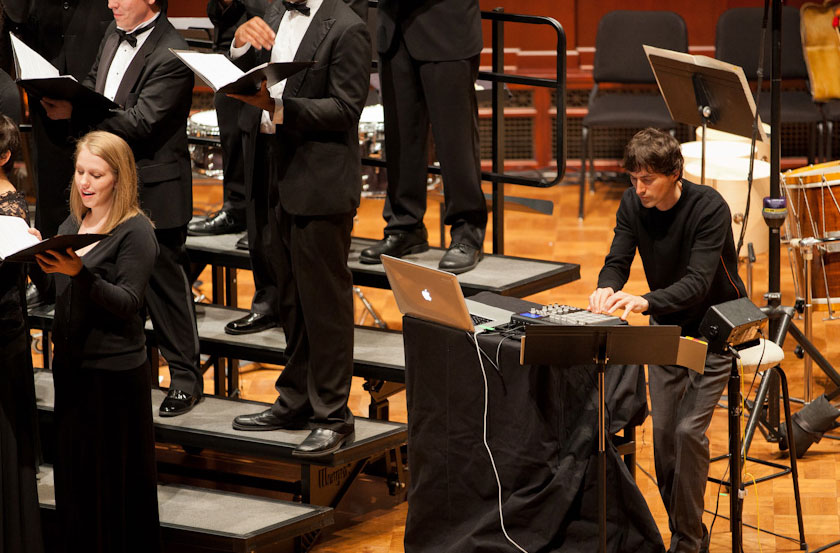On Mason Bates’ Alternative Energy
Photo: Mason Bates (right) performs Mass Transmission during last year’s San Francisco Symphony American Mavericks festival. His Alternative Energy will be performed by the Chicago Symphony Orchestra on September 27 at Hill Auditorium.
Photo by Mark Gjukich Photography.
Perhaps you’ve heard Mason Bates’ name, perhaps you’ve seen his picture; maybe you know he’s young, widely performed, broadly heralded and highly esteemed.
Neither Mason Bates nor his music reiterates the style or sentiment or personality of the goliaths of American Music who now enjoy the autumn of their careers and whose influence will begin, if not continue, to wane as more and more younger composers begin to assert themselves in American contemporary music. Yes, Mason Bates is part of a sea change because his music demands orchestras to expand their horizons, and because it brings sounds one would never associate with classical music into the concert hall. Alternative Energy is a fantastic example of this fact.
It is well known Mason Bates carries on two musical lives – one as a jet-setting, highly sought-after composer of concert music, and another as a DJ, deep to his elbows in club music and other forms of electronica. Clearly, his creativity sits in between these two musical worlds, because the fingerprint of electronic dance music is almost always perceptible in his more traditional pieces.
Alternative Energy deliberately does not hide its electronic sounds, nor does it shy away from the clarity and kineticism of dubstep and other kinds of dance music. The work compellingly uses the orchestra and electronics to depict the story of American industry’s past, present and future; and, though the piece does not pander, it is undeniably accessible. This is Mason Bates’ secret ingredient: he presents unusual sounds in a welcoming manner.
Video: Violinist Gloria Justen goes toe-to-toe with Mason Bates (DJ Masonic) as he spins for a Mercury Soul event at Mezzanine in San Francisco.
We’ll call this a, “combination of individuality and populism”, and this sentiment lies at the heart of the trend in American composing for which Mason Bates is, already, an elder statesman. All across the country, composers much younger than he are similarly embracing their roots in various types of popular music and incorporating those sounds into their music more boldly, more unapologetically and more ubiquitously than any other generation.
Believe it or not, this kind of eclecticism has typified American music from its beginning – after all, our national anthem borrows a tune from a popular 18th century British drinking song. After decades of esotericism, experimentation and conservatism, maybe American composers are, at last, armed with the experience and gumption to synthesize, from the elements of our culture, a music that clearly reflects and connects their unique identity and the larger world.
Alternative Energy explores and enhances the dynamic range of the orchestra like never before – and if it is any indication for how American music will evolve in the next decade or so, we can all be assured of a diversely influenced and consistently exciting future of heartening concert music, orchestral and otherwise, in this country.







